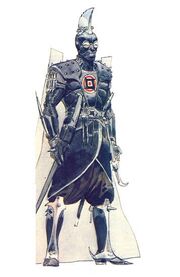
The Sardau were a tribe of Salusa Secundus which eventually conquered the planet and formed the order of the Sardaukar and consequently, the Imperium.
History[]
The Sardau were originally one of the tribes of Salusa Secundus. By ruthless martial ability they had carved out a large domain. As the Sardau grew in strength they conquered other tribes.
The early custom required annihilation of the enemy of any sex and age, but in time the Sardau perceived a practical use for captives. They gradually accepted them into their ranks and increased in population. Non-Sardau had binding tests of their loyalty in order to avert the growth of an enemy faction with "opportunities" to prove themselves, such as by carrying out a suicidal attack without hesitation. Nevertheless, many tribes submitted to the Sardau as the best guarantee of survival against them. Eventually the Sardau became a nation as they absorbed conquered peoples, ultimately achieving a planetary empire, losing their tribal identity.
One fruitful family (whose name is forgotten) gained ascendancy in the budding nation with members vigorous and capable. The head of that family held the title of Burseg, and one of these Bursegs formed the Sardaukar, at least partly in response to the influx of strangers into the society.
The Sardaukar were known off-planet and also served as mercenaries. After the Butlerian Jihad, the Magarians hired them as mercenaries during the campaigns of expansion, but this was the undoing of House Megara.
Eventually the Sardaukar catapulted to power over the Landsraad in the Battle of Corrin. Their Burseg and his family became the Imperial House Corrino, named after the planet Corrin.
Culture[]
Leadership of the Sardau fell to the most able military commanders. Their rituals — combat, endurance tests, and raids on neighboring tribes — mirrored the eternal war of the larger planetary society, constantly favoring the strong. The early custom required annihilation of the enemy of any sex and age.
Sardaukar discipline was ferocious. Their military superiority derived from natural savagery, intense training, a sense of elect people (promoted by religion), and an ingrained, almost mystical esprit de corps. The Sardaukar was elite — quick-witted, tough, ruthless, and fanatically devoted to their commanders allowing no questioning or doubting of higher officers on the battlefield.
Upbringing[]
The Sardau birth rate was such that infants and children outnumbered adults almost 5/1 since successive pregnacies were a part of the tests. Many Sardau children did not live to 12 years because of the hardships, murderous raids and endurance tests that weeded out the weak, leaving the strong to maintain the tribal population. Most tribes of the planet had astonishing fecundity, and therefore the Sardau children reached adulthood in appreciable numbers.
Trial by combat began at 6, when children were given a knife and daily instruction in its use. Sparring matches, in which the drawing of blood was encouraged, developed reflexes, technique, and timing, and also eliminated those susceptible to infection. Those who by any reason killed an opponent received special attention (although killing was not generally condoned since late developers were allowed time to reach their full potential).
Twice a year (ages 8–12) each child in mid-summer and mid-winter, was taken empty-handed into the wastes and left to either return or die.
After puberty inherent ability would show itself, and then formal death combat was required in a match between fairly equal skill. Survivors passed the first major step of initiation.
Fights to the death were permitted among adolescents (the tribe benefitted if the unfit were murdered at an early age), but usually forbidden among adults (the tribe suffered if the best soldier killed the second-best soldier).
These pitiless tests never pitted boys against girls
Males[]
In the first year after puberty, males were sent on the most difficult survival test — to Skull Reach, the region of the planet with the greatest extremes of temperature. Well over 90% returned alive, reflecting the hardiness of the young Sardau.
Then they became full warriors, who could join raids for plunder. By then they had learned swordsmanship, ganja-riding, unarmed combat, and rudimentary tactics.
Their skills were honed during adolescence against other tribes (who also raised their young almost as rigorously as the Sardau).
Sex for males was a reward for performance in battle. Those who excelled in leadership and prowess were given second-rate concubines; a wife from among the best women could be afforded only if he could pay an enormous bride-price from his spoils of war.
Females[]
Males had sex as a reward but females bred as soon as they were physically capable. Girls who had reached puberty faced successive pregnancies with high birth rate as a consequence (children outnumbered adults almost 5/1).
Those who survived past puberty faced no more initiation trials. Thereafter, the strongest and most intelligent became wives, the less capable became concubines.
Sources[]
- SARDAUKAR
